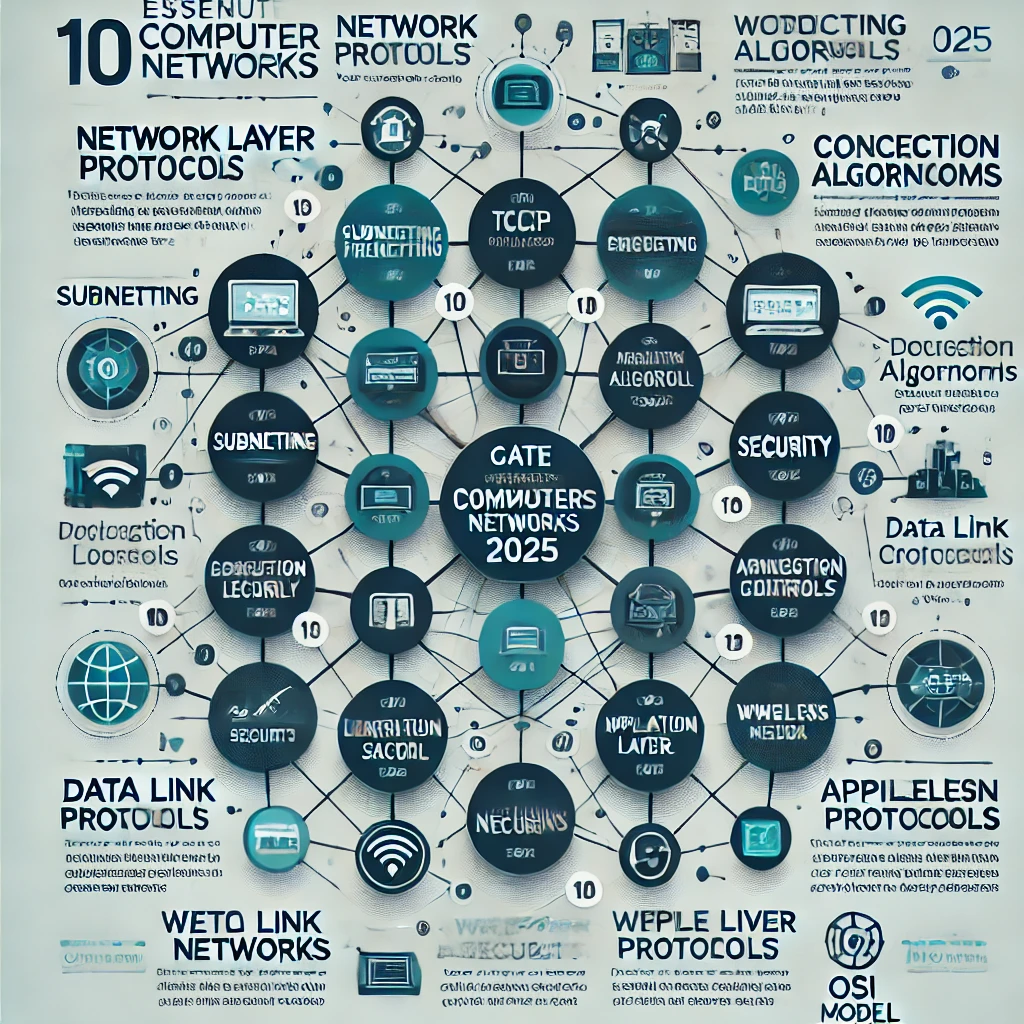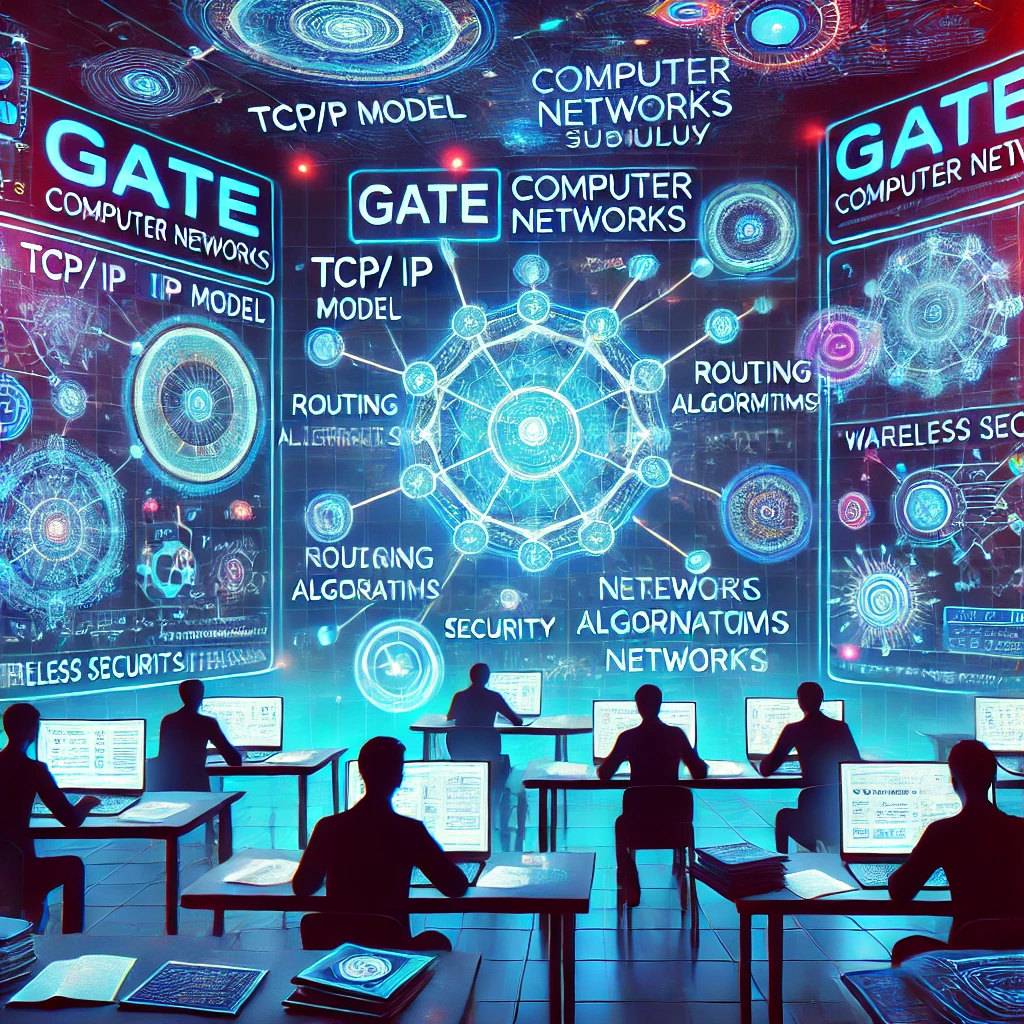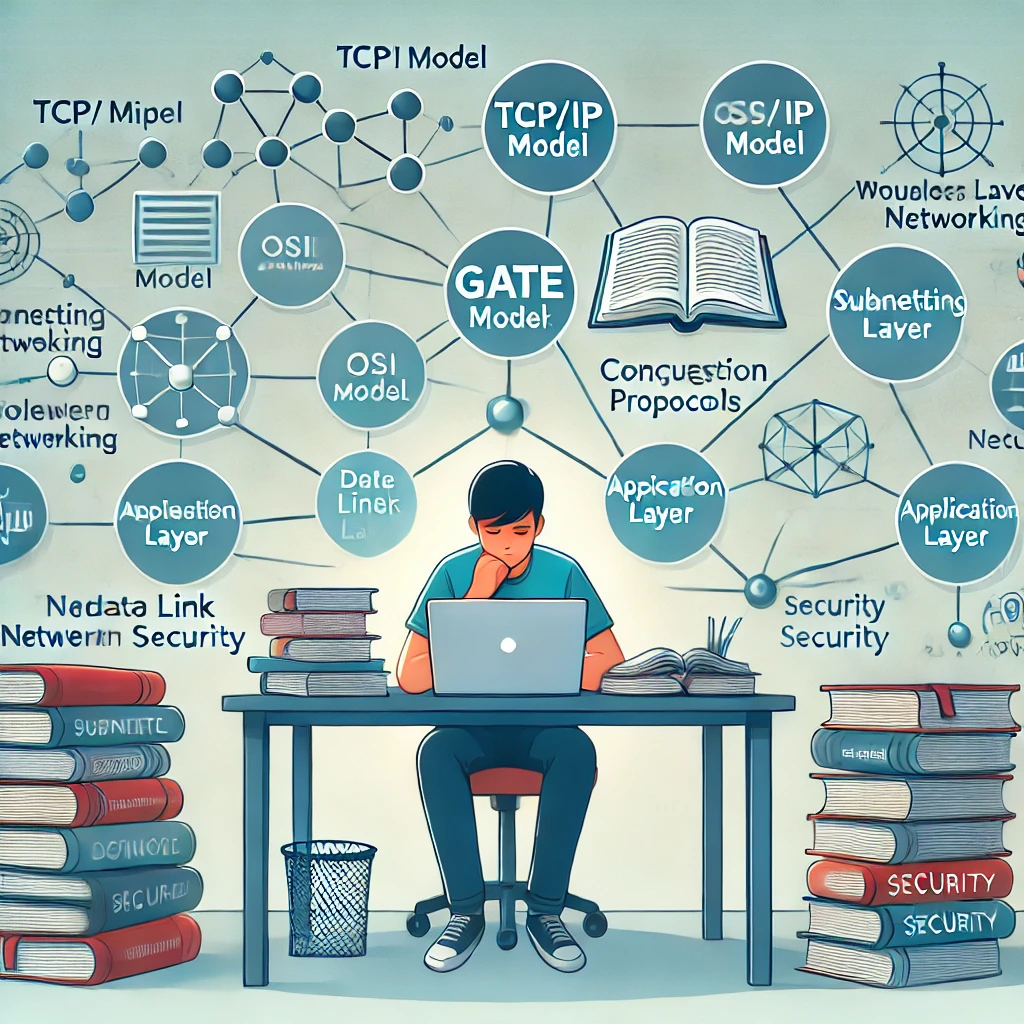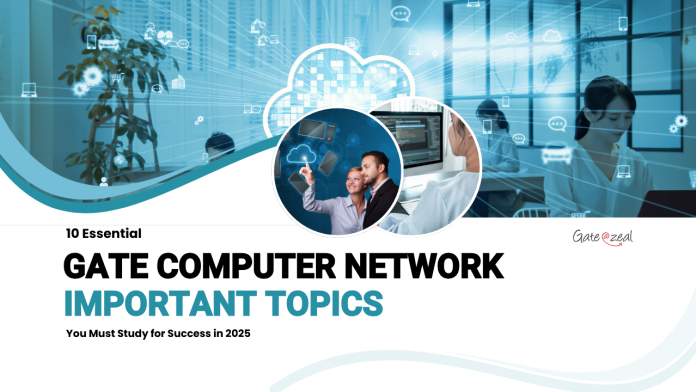Preparing for the GATE exam in Computer Science? One of the critical sections that can boost your score is the Computer Networks segment. The subject may seem complex with its multiple layers and protocols, but understanding the key topics can give you a significant advantage. In this blog, we will cover the GATE Computer Network Important Topics you need to study to ace this section. From network models and error detection techniques to transport protocols and security, this guide has you covered!
GATE Computer Network Important Topics Overview
Computer Networks is a vast subject area in the GATE syllabus. It requires a deep understanding of concepts and their practical applications. Here is a breakdown of the GATE Computer Network Important Topics that we will be discussing:
- OSI and TCP/IP Models
- Data Link Layer and Error Detection
- Network Layer and IP Addressing
- Transport Layer Protocols (TCP, UDP)
- Network Security Basics
- Congestion Control and Quality of Service (QoS)
- Network Devices and Topologies
Why Study GATE Computer Network Important Topics?
Understanding the key topics of computer networks is crucial not only for scoring high in GATE but also for practical knowledge in fields like network engineering and cybersecurity. The topics covered in this subject are often tested for both their theoretical understanding and problem-solving aspects.
Also Read: Top 10 GATE coaching centers in India

OSI and TCP/IP Models: The Foundation of Computer Networks
When discussing GATE Computer Network Important Topics, the OSI and TCP/IP models are fundamental. These models provide a layered architecture that defines how different network protocols interact.
- OSI Model: It has seven layers (Physical, Data Link, Network, Transport, Session, Presentation, and Application). Each layer has a specific function and handles a unique part of the communication process.
- TCP/IP Model: This model is more practical with four layers (Link, Internet, Transport, and Application). Understanding the differences and similarities between the OSI and TCP/IP models is crucial for GATE.
Key Concepts to Focus On:
- Layer functionalities and protocols
- Differences between OSI and TCP/IP models
- How data encapsulation works
Data Link Layer and Error Detection Techniques
The Data Link layer plays a pivotal role in error detection and correction. This is one of the most critical GATE Computer Network Important Topics due to its relevance in ensuring reliable data transmission.
Key Techniques to Study:
- Parity Check: A simple error-detection method that checks the parity bit to find errors in data transmission.
- CRC (Cyclic Redundancy Check): A more robust method used in networks like Ethernet for detecting errors.
- Hamming Code: A method for error correction that is often tested in GATE exams.
Understanding these techniques helps you solve numerical problems related to error detection and correction in the GATE exam.
Also Read: Best GATE CSE coaching : Gate at Zeal

IP Addressing and Subnetting: The Backbone of Network Layer
The Network Layer is a significant component of the GATE Computer Network Important Topics. IP Addressing and Subnetting form the crux of this layer, allowing efficient routing of packets.
Key Areas to Master:
- IPv4 vs. IPv6: Learn the differences between these versions and their respective headers.
- Subnetting and Supernetting: Mastering subnet calculations can give you a strong edge in solving GATE problems.
- CIDR (Classless Inter-Domain Routing): A method for allocating IP addresses that can simplify network configuration.
Subnetting problems are frequently tested in the GATE exam, making this an essential topic to study in depth.
Transport Layer Protocols: TCP and UDP
The Transport Layer manages data flow between systems, making it one of the high-priority GATE Computer Network Important Topics. Understanding the differences between TCP and UDP is critical for network communication.
- TCP (Transmission Control Protocol): A connection-oriented protocol that ensures reliable data transmission. Focus on features like three-way handshake, flow control, and congestion control.
- UDP (User Datagram Protocol): A connectionless protocol that is faster but does not guarantee delivery. It is used for applications like video streaming where speed is critical.
Key Concepts to Remember:
- Differences between TCP and UDP
- TCP header fields and their significance
- Use cases of TCP and UDP in real-world applications
Network Security: Protecting Data Transmission
Security is one of the most evolving topics in computer networks, making it an essential part of the GATE Computer Network Important Topics. This includes basic concepts of encryption, firewalls, and secure protocols.
Also Read: GATE CSE 2025 Subject Wise Weightage | Syllabus
Important Security Concepts:
- Symmetric vs. Asymmetric Encryption: Learn the difference between these two methods and their applications.
- SSL/TLS Protocols: Understand how these protocols ensure secure communication over the Internet.
- Firewalls and VPNs: Basic knowledge of how firewalls and virtual private networks protect data.

Network Topologies and Devices
A good understanding of network topologies and devices is crucial for solving GATE questions effectively. This includes studying common network setups like star, mesh, and ring topologies.
Key Devices to Study:
- Routers: Direct traffic between different networks.
- Switches: Operate at the Data Link layer and manage local network traffic.
- Hubs and Bridges: Legacy devices that are still important for understanding network history.
Frequently Asked Questions
What are the most important topics for GATE Computer Networks?
Understanding the OSI and TCP/IP models, IP addressing, subnetting, and transport layer protocols like TCP/UDP are crucial for scoring well in GATE Computer Networks.
How can I effectively prepare for the GATE Computer Networks section?
Focus on mastering fundamental concepts and practicing problem-solving for topics like subnetting, error detection, and transport protocols.
Is network security a major part of GATE Computer Networks?
Yes, basic concepts of network security, including encryption and secure protocols, are important for the GATE exam.
What is the difference between the OSI and TCP/IP models?
The OSI model has seven layers, while the TCP/IP model has four. Understanding their differences and functionalities is essential for the GATE exam.
How important is subnetting for GATE Computer Networks?
Subnetting is a key topic that is frequently tested in GATE, requiring strong problem-solving skills.
Can I skip lesser-known network devices in my GATE preparation?
While focusing on routers, switches, and hubs is enough, having a basic understanding of all devices can give you an advantage in theoretical questions.
Conclusion
Mastering the GATE Computer Network Important Topics is essential for achieving a high score in the GATE exam. By focusing on key areas like OSI models, IP addressing, transport protocols, and network security, you can enhance your understanding and problem-solving skills. Make sure to review these topics thoroughly and practice with sample questions to solidify your knowledge.










